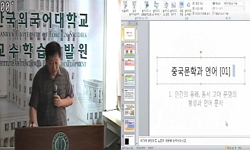After the Gabo Reforms, the civil service examination which was the official appointment system in the Joseon dynasty, was abolished. Each central departments tried to establish an independent recruitment system that took advantage of its characterist...
http://chineseinput.net/에서 pinyin(병음)방식으로 중국어를 변환할 수 있습니다.
변환된 중국어를 복사하여 사용하시면 됩니다.
- 中文 을 입력하시려면 zhongwen을 입력하시고 space를누르시면됩니다.
- 北京 을 입력하시려면 beijing을 입력하시고 space를 누르시면 됩니다.

갑오개혁 이후 관리등용방식의 변화와 관리 채용의 실태: 외무부서를 중심으로 = Changes in the Appointment of Government Officials and Their Actual Recruitment in the Foreign Office of the Korean Empire after the Gabo Reform
한글로보기부가정보
다국어 초록 (Multilingual Abstract)
After the Gabo Reforms, the civil service examination which was the official appointment system in the Joseon dynasty, was abolished. Each central departments tried to establish an independent recruitment system that took advantage of its characteristics. The biggest characteristic observed in the bureaucratic changes during the period of Gabo Reforms was the weakening of monarchy and strengthening the authority of reformative bureaucrats. It made the authority of the minister, the head of each department, greatly strenthen and emphasized the independence of each departments. In order to overview the new recruitment system after the Gabo Reforms, it is necessary to understand how each central departments tried to establish an independent recruitment system by utilizing the characteristics of its work.
Since 1894, the Foreign Offices in Joseon, the Foreign Affairs-Amun and the department of Foreign Affairs, reorganized the organization within the department following the central bureaucratic changes and established new offices: the official translator and the aide of him. In order to appoint government officials suitable for the new organization, it was also necessary to change the appointment methods. Therefore, this study examined the specific recruitment methods implemented after the Gabo Reforms, focusing on the Foreign Office. Through analyzing the academic backgrounds and careers of the officials in the Foreign Offices using their resumes, it was possible to categorize their appointment routes. As a result, after the Gabo Reforms, there were three main routes of recruiting officials in the Foreign Office, which could be categorized as those from foreign language schools, overseas studying and the internship program in the Foreign Office.
Among them, the internship program had become the most important recruitment route in the Foreign Office since 1899, when the “Gwangmu Regime” was established aiming for strengthening the authority of Emperor Gojong. In other words, the recruitment system of the Foreign office was resulted in the practical internship training system in 1899, maintaining the tendency to value new educational experiences after the Gabo Reforms in 1894.
국문 초록 (Abstract)
갑오개혁 이후 국가의 공식적인 관리등용제도였던 과거제가 폐지되면서 각 중앙 부서는 각자의 특징을 살린 독자적인 관리 선발 시스템을 구축하고자 하였다. 갑오개혁기의 관제 변화에서 ...
갑오개혁 이후 국가의 공식적인 관리등용제도였던 과거제가 폐지되면서 각 중앙 부서는 각자의 특징을 살린 독자적인 관리 선발 시스템을 구축하고자 하였다. 갑오개혁기의 관제 변화에서 관찰되는 가장 큰 특징은 군주권을 약화하고 개혁 관료의 권한을 강화하면서 각 부서의 독립성을 강조하고, 각 부서의 수장인 대신의 권한을 크게 강화한 점이라고 할 수 있다. 이러한 갑오개혁 이후의 새로운 관리등용제도의 전체상을 살피기 위해서는 각 중앙 부서가 업무의 특징을 살려 독자적인 관리 선발 시스템을 어떻게 구축하고자 했는지를 파악해야 할 필 요가 있다.
1894년 이후 외무부서인 외무아문(外務衙門)과 외부(外部)는 중앙의 관제 개 편에 맞춰 부서 내의 조직을 재편하고 실무를 전담할 수 있는 새로운 관직인 번역관(繙繹官)과 번역관보(繙繹官補)를 설치했다. 새로운 조직에 맞는 관리를 등 용하기 위해서는 관리 등용 방식 또한 변화할 필요가 있었다. 따라서 이 연구에서는 외무부서를 중심으로 갑오개혁 이후 시행된 구체적인 관리 선발 방식을 살펴보았다. 관리의 직접적인 채용 방식이 나타나지 않는 사료의 한계 상, 외부 소속 관리의 이력서에 나온 학력과 경력을 분석하여 이들의 등용 경로를 역추적하 는 방식을 사용하고 유형화를 시도하였다. 그 결과 갑오개혁 이후 외무부서의 주된 관리 등용 경로는 크게 세 가지로, 외국어학교 출신자, 외국 유학생 그리고 외부 견습생 출신자로 유형화할 수 있었다.
이 중에서도 특히 외부 견습생 제도는 황제권 강화를 지향하는 ‘광무정권’이 확립된 1899년 이후 외무부서의 가장 핵심적인 관리 선발 경로로 자리하게 되었다. 즉, 외무부서의 관리 채용 시스템은 1894년 갑오개혁 이후 신교육 경험을 중시하는 경향을 견지하면서 1899년의 실무형 견습생 육성 제도로 귀착되었던 것이다.
동일학술지(권/호) 다른 논문
-
- 역사학연구소
- 김봉국
- 2023
- KCI등재
-
- 역사학연구소
- 최보민
- 2023
- KCI등재
-
이미지는 말할 수 있는가: 『매신 사진순보』로 생각한다
- 역사학연구소
- 최규진
- 2023
- KCI등재
-
1920년대 일본 노다와 조선 원산의 노동조합운동 비교: 노동학교, 소비조합, 어용노조를 중심으로
- 역사학연구소
- 현명호
- 2023
- KCI등재




 DBpia
DBpia



